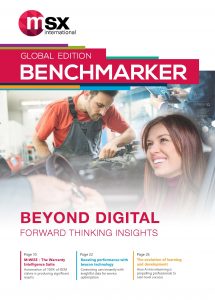The vehicle for navigating the zettabyte era and beyond
By Tathagata Sarkar, MSX Director of Product Engineering & Innovation
If you are a startup in Europe, then Berlin is the place to be. With a new startup founded every 20 minutes in the city, Berlin is a breeding ground for entrepreneurs who seek to change the world through innovation.
The new MSX Digital Innovation Hub is a state-of-the-art research and development facility where automotive experts join forces with business consultants, engineers, software developers, and data scientists with one mission in mind – designing next-generation BPO services and solutions. MSXI is introducing the automotive industry to a portfolio of new digital technologies and related business initiatives, that aim to increase operational performance and profitability and spark innovation across the entire organization.
The new Digital Innovation Hub is situated in the heart of one of Europe’s most vibrant and high-tech cities, Berlin. With more than 1,300 start-ups, the iconic capital is fast becoming recognized as the Silicon Valley of tomorrow. MSXI proudly shares the landscape with tech giants like Alphabet, Apple, and Amazon, all of whom have opened new offices in the neighborhood. Furthermore, Berlin’s tech scene and progressive culture are attracting the best and brightest talent from around the globe, creating a truly unique pool of talent and world-class professionals.
Digital Ventures, a division of Boston Consulting Group, is a strategic collaborative partner for this Digital Innovation Hub project bringing into the mix additional cutting-edge technologies for optimization of data, creating a link between data storage and Artificial Intelligence (AI) systems. Companies also need a good balance between internal sourcing of innovation, utilizing the company’s own capabilities, and external sourcing of innovation, including collaborating with deep-tech pioneers. This joint technology partnership is producing a high precision automated pipeline to identify which bits of data are relevant for efficiency modeling. With so much data flowing in today’s digital ecosystem, it is becoming clear, that management of data is evolving.
Smart cities are relying on optimized data analytics for the advent of future mobility, and our Digital Innovation Hub arrives just in time. Autonomous vehicles will generate 4,000 gigabytes of data per day according to Intel. OEMs are in unchartered territory when it comes to the sheer amount of data management capability that is required for their products. A good example of our optimized analytics capability in the zettabyte era is Airbus making its way into the automotive scene. Airbus, universally known for aviation, has recently partnered with ITAL Design creating a concept to solve the future needs of megacities – such as Rio de Janeiro and Shanghai – plagued with over congested roadways. It’s a zero emission vehicle capable of flight, cosmically referred to as Pop. The three-stage, autonomous flying pod prototype has risen to fame following the 87th Annual Geneva International Motor Show in Switzerland, where it was well received by industry experts and spectators alike. Clearly, with these future projects coming to market, great waves of data follow in their wake and it’s important to understand which specific data is vital for decision making in the future. At this very moment in history, a diverse team of experts is engaging with AI, quantum machine learning, data analytics, and digital systems to address the growing need of the automotive industry to restructure existing business models for the future.
Furthermore, efficiency improvements involve large amounts of data within the automotive sphere, where vehicles create tremendous volumes in a microsecond. Attention must be given to identifying what information is important for increasing operational performance, and how well the businesses strategize efficiencies by understanding real-time data. Being efficient with the amount of data needed for analysis is equally beneficial for the company’s best performance. When it comes to the revolutionary modern car market, which data sets are important for decision making? A methodology in determining what data to store and what data to cache will take center stage in the years to come. AI supercharged systems, once initiated, are sophisticated enough in scope to answer this exact question with detailed insight. Other concepts like this are just the beginning of a great awakening for the modern automotive world.
The future of mobility is currently showing sophisticated avenues for gathering raw data from existing processes and translating it into actionable information, which is an improvement in retail performance. This existing information is optimized to improve and modify processes in order to maximize market profitability. MSXI Digital Innovation Hub with AI-powered machine learning systems are accurately forecasting cost-effective navigation with respect to each domain, in an entirely new structure, ultimately improving upon existing OEM processes.
Remaining competitive in today’s marketplace boils down to how well a business manages its key processes now and in the future. Data optimization is important when tough decisions are made; MSX has the expertise and with the new Digital Innovation Hub, is systematically driving methods of gathering and studying data that produce proven results, in the present, in the future, and beyond.
There are many challenges throughout the dealer network. With an increase in vehicle complexity, warranty processes and dealership competency levels need to improve to remain competitive. The number of first-time fixes is a key performance indicator of warranty efficiency metrics. Dealerships vary in capability depending on many factors such as inventory, training, and capability in providing quality service across the board. For example, one shop may have an impeccable first-time fix rate service record, due to investing in modern facilities, a skillful and intelligent workforce, implementing best practices and brand value on a local level. This boosts customer loyalty and increases revenue for that location. Keeping up to date on current model service information and proactively stocking the correct parts for a common fix is boosting the market saturation and increasing efficiency and customer confidence.
On the other hand, there are dealerships within the same network area who are struggling with their firsttime fix rates. These dealerships are underperforming. Digitalization provides data specific, actionable information to support better decision making in the future and to help improve dealer performance whilst driving out warranty waste. The comparison of two service garages concerning first-time fix rates is just one example of efficiency versus inefficiencies when warranty management assessment tools are in place. When it comes to warranty management, better decision making involves automotive experts initializing the M:WISE digitalization platform across the OEM’s dealer network. The digital platform is capable of enhancing the day-to-day, minuteby- minute claim performance data that translates into an improved quality of service. This equates to
improvements in workshop productivity, customer confidence and brand loyalty. Additionally, boosting the digitalization platform with real-time diagnostic information from the customer’s vehicle supports the claim management process. When integrated with technical support, this information helps the workshop to correctly repair a vehicle, reducing warranty cost and bringing the warranty performance to a new level.
Mobility trends are pointing towards a new mindset when it comes to vehicle ownership. Individuals, especially in urban areas, prefer to use ride sharing services. The trending curve suggests OEMs intend to increase fleet operations. Projections indicate in this segment that consumers purchase rides, as opposed to owning vehicles. The warranty management costs will solely reside with the fleet owners of ride-sharing networks. With the advent of new mobility opportunities, especially autonomous vehicles, scheduling technical updates and maintenance programs boils down to keeping the cost of ownership as low as possible. OEMs will increase their penetration in future mobility concepts with fleet ride-sharing networks to remain competitive and profitable. Keeping the OEM‘s best interests in mind, a digitally integrated warranty management platform is the intelligent answer to cost control in the future of mobility.
Digital solutions are vital to OEMs and their dealer networks to navigate the road ahead. The MSXI warranty journey delivers the OEM a foundation to enable the required transformation of warranty processes, allowing MSXI as a partner to bring best practices in the industry, and to be part of the shared objective of a reduced warranty bill, optimized costs control and a predictive, low risk infrastructure.


